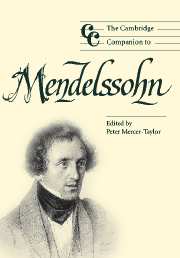Book contents
- Frontmatter
- Introduction: Mendelssohn as border-dweller
- Part I Issues in biography
- Part II Situating the compositions
- Part III Profiles of the music
- 6 Symphony and overture
- 7 The works for solo instrument(s) and orchestra
- 8 Mendelssohn's chamber music
- 9 The music for keyboard
- 10 On Mendelssohn's sacred music, real and imaginary
- 11 Mendelssohn's songs
- 12 Felix Mendelssohn's dramatic compositions: from Liederspiel to Lorelei
- Part IV Reception and performance
- Notes
- Select bibliography
- Index
12 - Felix Mendelssohn's dramatic compositions: from Liederspiel to Lorelei
from Part III - Profiles of the music
Published online by Cambridge University Press: 28 September 2011
- Frontmatter
- Introduction: Mendelssohn as border-dweller
- Part I Issues in biography
- Part II Situating the compositions
- Part III Profiles of the music
- 6 Symphony and overture
- 7 The works for solo instrument(s) and orchestra
- 8 Mendelssohn's chamber music
- 9 The music for keyboard
- 10 On Mendelssohn's sacred music, real and imaginary
- 11 Mendelssohn's songs
- 12 Felix Mendelssohn's dramatic compositions: from Liederspiel to Lorelei
- Part IV Reception and performance
- Notes
- Select bibliography
- Index
Summary
For someone who has not entered the pages of history as an opera composer, Mendelssohn's output of dramatic music was remarkable, and the attention attracted by his failure to complete a mature opera is unparalleled. To describe the first and explain the second are the objects of this chapter.
Had Beethoven and Schumann died, like Mendelssohn, at the age of thirty-eight, the lack of Fidelio (completed by Beethoven at the age of forty-four in 1814) or Genoveva (Schumann was forty at the 1850 premiere) would hardly have affected their final evaluation by posterity. Why is it, then, that Mendelssohn's unfulfilled operatic ambitions were considered such a significant – and suggestive – artistic failure? Two reasons come immediately to mind: first, had Mendelssohn lived only a year longer – as his contemporaries were acutely aware – the world might have witnessed the completion of Die Lorelei, an opera that occupied much of his creative energy in the months before his death. Other projects were in the queue, such as a commission for Her Majesty's Theatre in London, which had not reached fruition in time for the 1847 season, but which could well have seen the light of day the following year.
- Type
- Chapter
- Information
- The Cambridge Companion to Mendelssohn , pp. 206 - 230Publisher: Cambridge University PressPrint publication year: 2004
- 2
- Cited by



